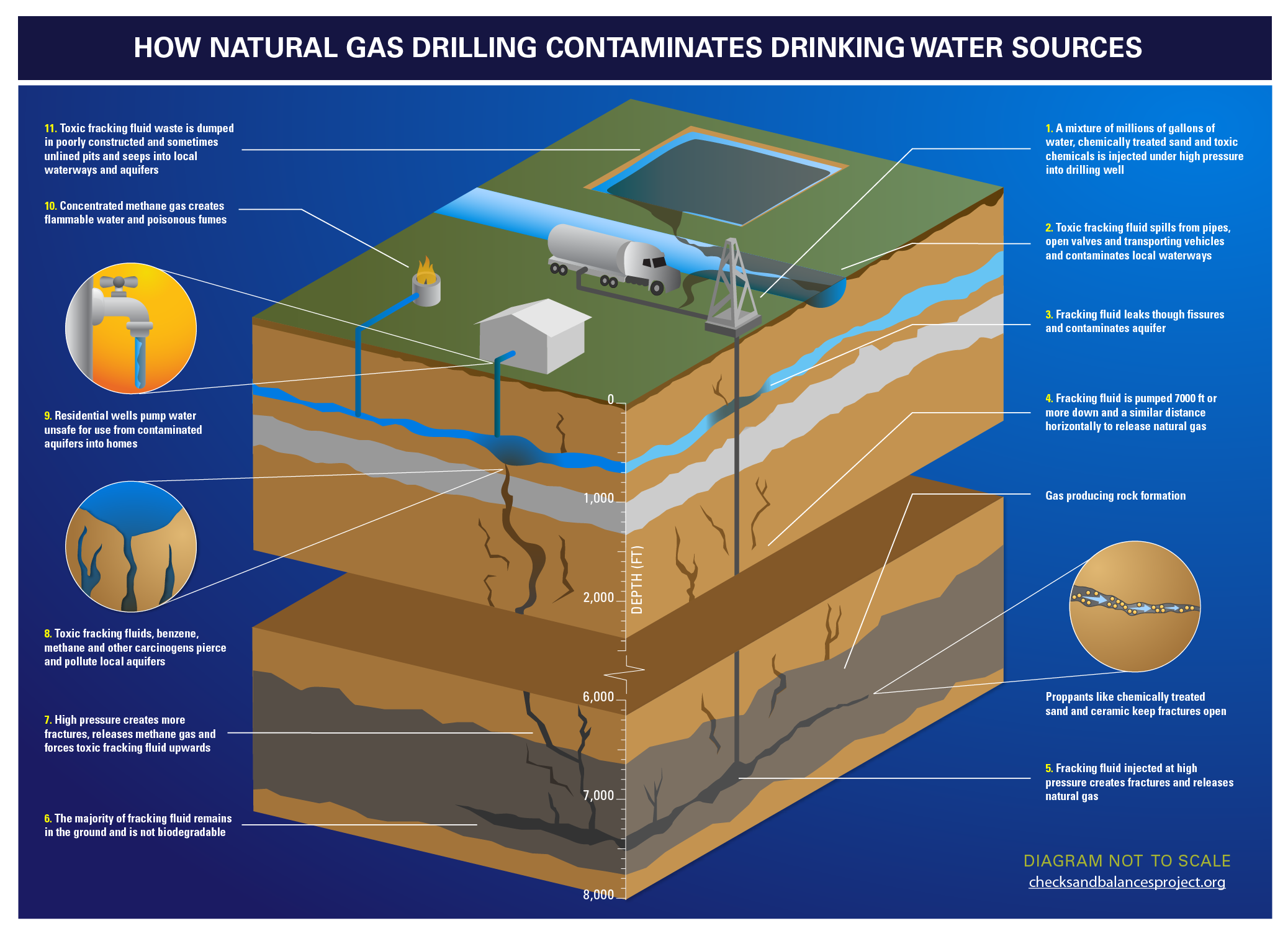Accounts from two experts show there are plenty of opportunities for toxic chemicals to enter drinking water supplies
As gas industry leaders prepare to discuss hydraulic fracturing at a congressional field meeting in California and at a Representatives’ briefing in DC, it will be interesting to hear what is said about the possibility of water contamination from hydraulic fracturing.
As recently as a week ago one contamination expert went on the record explaining exactly how the hydraulic fracturing process could contaminate water supplies. The expert is Dr. Conrad ‘Dan’ Volz, former director of the University of Pittsburgh’s Center for Healthy Environments and Communities, who has testified on hydraulic fracturing before Congress and appeared as an expert as part of water contamination investigations on ABC news.
Volz spoke with Checks and Balances Project director Andrew Schenkel last week at a public hearing on fracking in Pennsylvania.
“[Wells] are going to leak and they are going to leak when the cement shrinks and when the cement shrinks it pulls away from the geological layer that it is sealed from and then it serves as a conduit as straight into ground water aquifers,” Volz said. When asked if the chemicals could travel miles upward towards aquifers that lie well above the bottom of hydraulically fracked wells, Volz replied, “of course” (see video below).
[youtube=http://www.youtube.com/watch?v=m13KC_xaF3k]
Volz’s comments reveal how fracking, like all industrial processes, is an imperfect process. While many in the industry, like Aubrey McClendon of Chesapeake Energy and T.Boone Pickens have repeatedly said that water contamination from fracking simply doesn’t happen, Volz’s remarks point out that not only has contamination occured, but that there is plenty of potential for contamination because of the very nature of what is involved with fracking. The imperfect integrity of the concrete casings that frack wells are lined with is one obvious part of the fracking process that could lead to contamination. There are also complicated pressure dynamics to deal with at the extreme subterranean depths that fracking wells are drilled into.
These complicated processes don’t even take into account the transporting of chemical-laced fracking fluids above ground and the millions of gallons of toxic wastewater that result from a produced well. The diagram below shows several different points of the fracking process where water contamination could occur.
During a visit to Colorado in early 2011, Dr. Geoffrey Thyne, a geologist who studies drilling at the Enhanced Oil Recovery Institute at the University of Wyoming, explained to the Checks and Balances Project that the fracking process is most vulnerable to accidental water contamination at the surface. Like Volz, Thyne did agree that there’s certainly possibility of aquifer contamination based on flaws in the concrete casings of fracking wells as well as the other uncertainties that lie underground. But it is above ground that Thyne is most concerned about.
“You are handling millions of gallons of fluid at the surface. It is easy to spill. It happens all the time. Valves jam up, pipes break, this is not without hazard,” Thyne said.
Thyne is well known for his West Divide Creek Study in Colorado, which is widely considered one of the first studies that conclusively linked fracking chemicals to water contamination in Garfield County, Colorado. When talking about the possibility of handling chemicals without causing any contamination, Thyne pointed out that even the most careful handlers of high amounts of chemicals make mistakes. He points to the United States military, which he says conducts the largest scale industrial processes in the world.
“It has an incredibly good safety record, but still things break, things go wrong, somebody doesn’t do a careful enough inspection, sometimes it’s also an act of nature. It is impossible to assure one hundred percent safety in any of these processes.”
[youtube=http://www.youtube.com/watch?v=Y_7FK2q2eJ4]
Both Volz and Thyne’s comments and research directly refute much of the rhetoric of the oil and gas industry, and even some regulators, who claim with certainty that the hydraulic fracturing process does not contaminate water supplies. This raises many questions, one of which is what happens once contamination occurs. When asked if contamination to something like aquifers could be completely undone, Volz said, “No, you cannot ‘uncontaminate’ it. Not in the way that we think you can uncontaminate it. If it is a confined aquifer there is no ‘uncontaminating’ it.”
[youtube=http://www.youtube.com/watch?v=-_F6l7zXYHY]
The scientists’ comments suggest that there is plenty to be concerned about when it comes to the large-scale hydraulic fracturing taking place in the states like Pennsylvania, Colorado, Wyoming, Texas, Oklahoma and New Mexico. In all the fracking states there are different regulations, different ways of dealing with fracking fluids and fracking wastewater. And in all of these states, according to the words of these scientists, there is plenty of potential for water contamination from fracking both above and below the ground.







Recent Comments